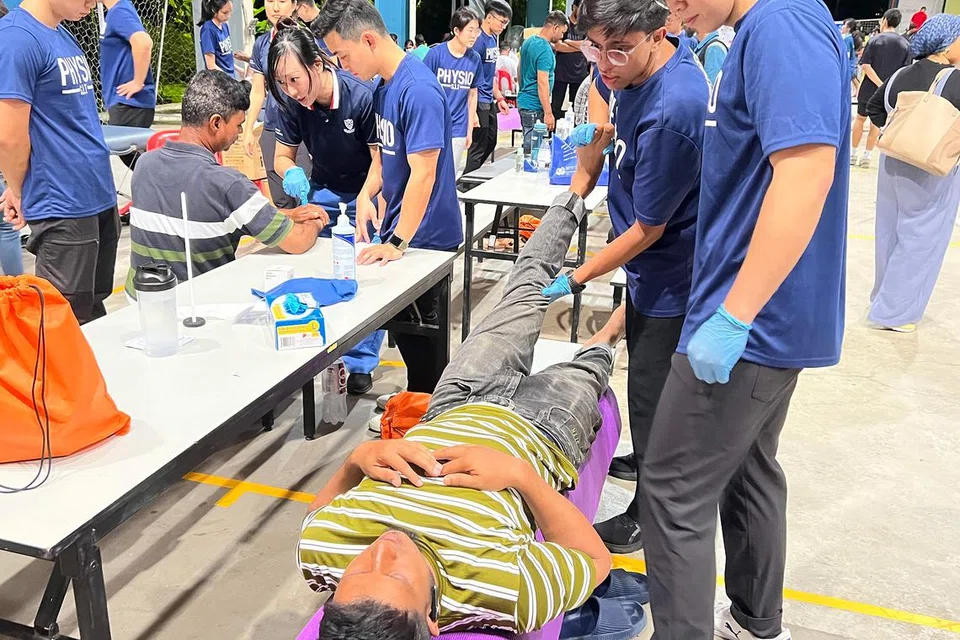Health, safety and environment (HSE) coordinator Ramadas Saravanan recalls how he was walking around his dormitory at 11.45pm earlier this year when he saw his co-worker sitting in a corner and weeping while talking on the phone.
Concerned, Mr Saravanan, 40, who works at Hai Leck Engineering, soon learnt that his colleague’s mother had died in India.
His co-worker said to him: “Brother, I am the only son. I want to see my mother one last time. I need to return to India for the last rites, but I don’t know what to do. It’s close to the end of the month, so I don’t have money.”
This is one example of the various struggles migrant workers in Singapore face. Whether it is missing family or dealing with the burden of paying off debts back home or getting a call informing that a loved one has died, workers’ emotions are in constant turmoil. For them, such woes and distractions may lead to serious – even fatal – lapses at work.
“This is precisely why it’s so important migrant workers do not suffer in silence,” said Mr Saravanan, who took part in the Walk Your Way To Better Health event at West Coast Park on Oct 13.
The 2km walk was organised by the Ministry of Manpower’s Assurance, Care and Engagement (ACE) Group, along with partners such as HealthServe, Passion To Serve, 24asia, the Singapore Institute of Technology (SIT) and Big At Heart, in celebration of World Mental Health Day.
The walk brought together 312 people, including some 250 migrant workers.
Workers participated in games and a yoga session, and were taken to Penjuru Recreation Centre for a mental health roadshow.
ACE Group chief Tung Yui Fai addressed the workers: “We want all of you to find friends and talk to each other. We have some peer support leaders (PSL) here too. These are your friends who live in the dorm, so when you have problems, you can talk to them.”
The PSL scheme was started in 2021 by HealthServe, a charity dedicated to migrant workers, and has provided psychological first-aid training to more than 1,200 migrant workers.
Mr Saravanan has served as a PSL for the past two years.
In the case of that dormitory mate who needed to return home, Mr Saravanan donated $300 and collected funds from his supervisors and co-workers to buy a plane ticket.
At Fortis Construction, which has around 2,800 migrants working for them, initiatives are in place to safeguard their mental health. The company recently held a roadshow at its worksite to educate workers on good mental health initiatives.
Mr Guru Sangarathas, 44, safety manager at Fortis Construction, said: “We have a mental health first-aider programme, where we check in with our migrant brothers every week.
“We also have a gym with professional trainers at the dormitory as well as prayer rooms, and we cater freshly prepared meals for them.”
One of the highlights at the Penjuru roadshow was the personalised physiotherapy sessions conducted by SIT’s physiotherapy faculty, students and alumni.
Assistant Professor Audrey Lim Ei-Ping, who leads the SIT physiotherapy team, said: “This is not the first time the SIT physiotherapy team and SITIntegrates are doing an outreach like this, but this is on a much larger scale.
“Besides treatment, we also teach them some exercises to prevent injuries or pain from worsening. If workers are not in a good physical condition, it increases mental stress.”
SITIntegrates, a student-led group focusing on community integration for migrant workers, also created a giant Jenga game. This was part of SIT’s 10 Acts for Good – a year-long initiative to commemorate the institution’s 10th anniversary as an autonomous university.
Ms Kiran Kaur, 22, the head of publicity for SITIntegrates, said: “Many migrant workers face communication barriers with their supervisors and this leads to them being scolded often, which may impact their mental health.
“I hope they can be better understood because they contribute a lot to Singapore.”
Migrant workers who need urgent help can call HealthServe’s 24-hour helpline at 3129 5000 or the Migrant Workers’ Centre at 6536 2692.

